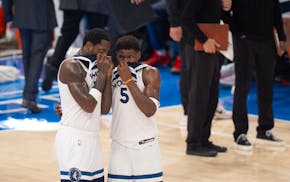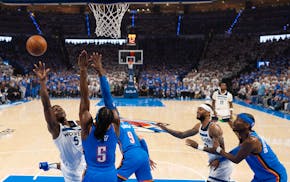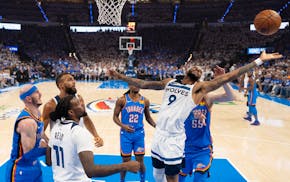The Timberwolves are in the NBA Western Conference finals for the second time in as many seasons, but this series was framed as polar opposite to 2024.
They were well-rested, coming off their second-round near-sweep of the Golden State Warriors. Last season, the Wolves had to grind through a seven-game slugfest against the Denver Nuggets in the second round.
And yet, after a 128-126 loss to the Oklahoma City Thunder in Game 4 on Monday, the Wolves find themselves in the same position: down 3-1 and preparing for a must-win Game 5 to keep their season — and their hopes for a first trip to the NBA Finals in their 36-year history — alive.
It's both win or go home, and win and go home, if the Wolves force the series back to Minnesota for a Game 6 on Wednesday.
"We're just trying to get another home game and trying to play in front of our home crowd again," Wolves guard Donte DiVincenzo said. "Everybody has counted us out all year. We've been through a lot. We're together as a locker room. We don't care what the media is going to say."
Last season, playing in their first conference finals since 2004 and down 3-1 to the Dallas Mavericks, the Wolves were handed their biggest loss of the series, 124-103 at Target Center in Game 5. They found themselves down early against Dallas, as Luka Doncic and Kyrie Irving dropped 36 apiece and helped Dallas spring out to a 35-19 lead by the end of the first.
Oklahoma City, the top seed in the West after setting an NBA record (+12.9) for point differential, won the first two games of this series at home.
"At home, they start super well, so we've just got to [slow] their little run at the beginning," said Wolves guard Jaden McDaniels. "We've got to play tougher, playing stronger and just hold them to one shot."
Only 13 teams in 296 playoff series in NBA history have come back from 3-1 deficits — most recently, the Denver Nuggets, who accomplished the feat twice in 2020. Oklahoma City let a 3-1 lead slip to the Warriors in 2016's Western Conference Finals.
The Wolves face the added challenge of staging a series comeback against the team with the NBA's best regular-season record (68-14, compared to the Wolves' 49-33), led by the league's MVP, guard Shai Gilgeous-Alexander.
"They finished first in the NBA for a reason," DiVincenzo said of a Thunder team that hasn't lost three games in a row this season. "They get to where they want to get to. They get to the free-throw line at crucial moments. We have to weather that storm and do our best to not put them on the free-throw line."
After dropping a season-low 14 points in the Wolves' 141-103 Game 3 win, Gilgeous-Alexander scored a playoff career-high 40 on Monday, shooting 13-for-30 from the field and 12-for-14 from the free-throw line.
"[Game 3], he was seeing like three or four bodies," McDaniels said. "I feel like this game, he only seen like the man guarding him and the main gap person."
On Monday, the Wolves' bench had to outscore their starters, 64-62, to keep the game close. Nickeil Alexander-Walker led Minnesota with 23 points off the bench, while DiVincenzo scored 21. The Thunder forced 23 turnovers — seven in the first quarter — and kept Anthony Edwards (5-for-13 for 16 points) and Julius Randle (1-for-7 for 5 points) quiet for the Wolves.
"We've gone through these periods before," coach Chris Finch said Tuesday. "We know we've got to stretch the floor, create more depth in transition, get those guys to the bottom of the floor for a variety of reasons, so it should be a pretty easy adjustment.
"Just got to put the effort in."
Alexander-Walker recalled Finch calling the team out after a February loss to the league's worst team, the Utah Jazz, after which Minnesota went 17-4 to finish the regular season.
But this time, the Wolves only have a single game to prove that their wake-up call was well received.
"Every time we've had a come-to-terms talk with each other, we've always responded well," Alexander-Walker said. "We have a resilient group.
"We've got to play like there's no tomorrow because there isn't. It's not about how much we can score. It's about: Can we get the stops? Can we rebound? Can we find a way to make winning plays relentlessly and consistently?"
Gophers football to play Friday night games against Nebraska and Oregon this season

RandBall: 10 things to know today in Minnesota sports

Minnesota Top 25: The Star Tribune's statewide high school softball ranking

Suddenly, it's over: Timberwolves' season ends with humbling loss to Thunder

